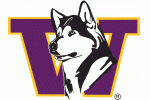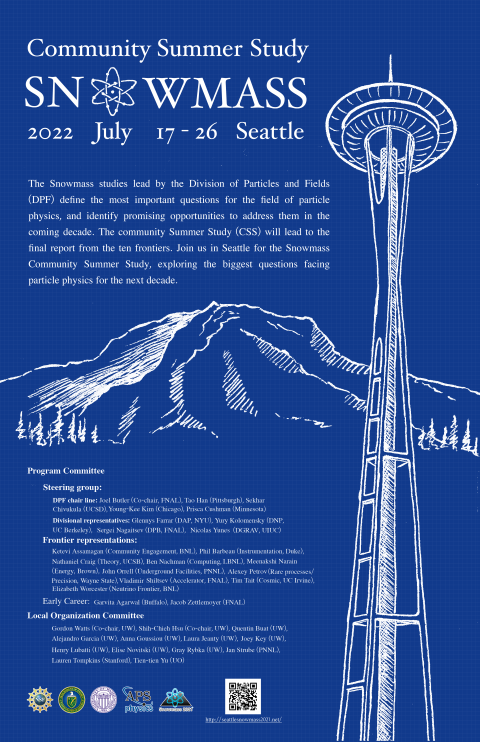Published: Apr 17, 2022 by
The Division of Particles and Fields of the American Physical Society is pleased to announce the Snowmass Community Summer Study, a workshop hosted by the University of Washington’s Physics Department on its campus in Seattle from July 17-26, 2022! See the conference website for up-to-date information about the workshop.
The Seattle meeting is the culmination of the various workshops and Town Hall meetings that have taken place during 2020, 2021, and 2022 as part of Snowmass21. As we have throughout the Snowmass process, we aim for everyone’s voice to be heard. Contributions and participation from the community in this workshop are critical for the success of Snowmass21 and they will occur as part of one or more working groups directed by conveners.
This bulletin contains information on the workshop, registration, travel and accommodation, and some background on the Snowmass process, Seattle, and the University of Washington. If you have questions do not hesitate to contact us: snowmass-loc2022@uw.edu.
We’d like to thank our partners who are helping to support the event: NVIDIA, RadiaBeam, and Universe.
Immediately preceding this Snowmass Summer Study, the University of Washington is organizing a three-day workshop in honor of University of Washington Professor Ann Nelson, a renowned theorist who died in 2019; see below for details.
The Workshop
The conference will be hybrid, with a substantial in-person presence for those who want to interact directly with their colleagues concerning the future of US High Energy Physics. The DPF and Snowmass coordination teams encourage everyone who is able to attend in person to do so. While remote access will be available, the quality and productivity of face-to-face discussions justify in-person participation. The workshop will commence with a day of plenary talks to set the stage for the following week. This is followed by seven days of parallel sessions in the mornings and panel discussions, colloquia, and community-wide town-hall style meetings in the afternoons. The parallel-session days will include industry exhibitors and poster sessions. Finally, the workshop will close out with 1.5 days of plenary sessions summarizing the work, reports, and future directions intended to inform the P5 Panel. There will be a reception on July 18 and dinner on July 22. A public lecture will be given on July 20 by Adam Riess, one of the winners of the 2011 Nobel Prize for Physics, from Johns Hopkins University. Networking and outreach activities are being planned. Remote access to the plenary and parallel sessions, as well as panel discussions and colloquia will be provided via Zoom.
Registration Information: Early-bird registration will open on May 1, 2022. Normal registration will open on June 13 at 11:59 pm, and late registration will open on July 3, 2022. Registration fees for early-career members such as students and postdocs will be 50% or less than that for senior members. When normal registration opens, we will also open registration for remote participants. The remote registration cost for senior members of the community will be less than in person, and substantially cheaper for early career members.
Poster Session: The poster session is open now and accepting submissions. This is the only part of the workshop driven by abstract submission. A poster will only be accepted if its creator plans to attend in person. Please submit your abstracts before May 9, 2022, to assure a decision well before the end of the Early Bird registration period. We will send notification of the acceptance of your contribution by email on May 16, 2022. We encourage posters from students, postdocs, and scientists contributing actively to the Snowmass process. Poster topics must relate to the Snowmass scope as defined in the Frontiers or to relevant issues concerning the future of HEP. Prizes for the best posters by early career members will be awarded at the workshop. Further instructions on the formatting of the posters will be made available closer to the conference. To submit a poster abstract, please use the indico conference site.
Accessibility (disability accommodations, childcare): It is important to all of us and the community that everyone be able to take advantage of this workshop. We have some limited funding that we can apply to achieve this and we want to use it effectively. We would like to know as soon as possible if you require special accommodations. We have set up a survey to collect information about each individual’s needs for childcare and/or hearing, mobility, dietary, lactation, medical, or similar accommodations. Earlier surveys have collected general information about accessibility. This non-anonymous individual survey will give us the information we need to best meet the needs of individual participants. You may alternatively contact the organizers by email. It will be a huge help to the organizers if participants can provide this information as early as possible. If you do not have any requests, please do not fill out the survey.
The Location
The City of Seattle: Seattle is a wonderful city, with many tourist attractions, surrounded by a scenic landscape, including volcanic mountains and open sea, that is particularly beautiful during the summertime. It offers many outings accessible by day trips.
University of Washington: The University of Washington is a public university with about 50,000 students. Its main campus, where the Snowmass meeting will take place, is located about 3 miles north of downtown Seattle. Travel & Accommodation
Air Travel: Seattle is served by the Seattle-Tacoma Airport (SEA-TAC), which is the main commercial airport of this region. It is a primary hub for Alaska Airlines and United Airlines; Delta and American also have many flights there. Over 20 airlines fly into and out of the airport. Over 100 cities and airline hubs connect to SEA-TAC. It is an international airport, with direct connections to Paris, Frankfurt, Brussels, and other cities in Europe along with many connections to Asia.
Conference Accommodation: Individual dormitory rooms are available at approximately $110/night. These are of modern construction that are only a 10–15-minute walk from the meeting rooms and include private showers and excellent WIFI. Dorm rooms can be shared (2 people to a room) if desired. We are working on dorm accommodations for families and will have complete information when registration opens. There are hotels in downtown Seattle and nearby that offer rooms over a wide range of prices. There are also opportunities to book accommodations via Airbnb and similar services.
Transportation around Seattle: Seattle is served by a vibrant public transportation network. This includes a light-rail line that directly connects the airport and the university. The city features an extensive bus network. It is also served by taxi, Lyft, and Uber. ZipCars and car rentals are also available. However, parking around the university is a challenge.
COVID-19
Omicron’s rapid rise taught the community that it is difficult to plan in-person meetings very far in advance. Our host, the University of Washington, will assist us in providing a safe environment, employing all required and in some cases additional, measures and precautions. The Local Organizing Committee will monitor developments in the pandemic and will make whatever changes are necessary to the conference format to maintain the health and safety of participants, which is our highest priority.
More Information
The Snowmass Process
More information about Snowmass and the Snowmass Community Planning Exercise is accessible through a portal TWiki
Snowmass21 is a yearlong study hosted by the Division of Particles and Fields (DPF) of the American Physical Society (APS), which takes place approximately every ten years. Its purpose is to define the most important questions for the field of particle physics and identify promising opportunities to address them. The study aims to be community-driven, inclusive, global, transparent, and interdisciplinary. Therefore, people outside the US and from other related fields are welcome to participate.
Snowmass scientific activities are organized into ten “frontiers”, study areas at the cutting edge of our knowledge of particle physics and the techniques and methods required to pursue it. Details may be found at the snowmass21 website. Each frontier has multiple conveners who together lead and coordinate the activities of the frontiers. While the major work of the study is done within frontiers, many of the topics cut across two or more frontiers so a system of liaisons makes sure that all parties with a stake in a given study are represented. Each frontier is further organized into Topical Subgroups. There is an average of 8 Topical Subgroups per frontier. Each Subgroup has multiple conveners. The frontiers are the Accelerator Frontier, Cosmic Frontier, Community Engagement Frontier, Computation Frontier, Energy Frontier, Instrumentation Frontier, Neutrino Frontier, Rare Processes and Precision Measurements Frontier, Theory Frontier, and Underground Facilities and Infrastructure Frontier. There is also the Snowmass Early Career group, with connections into all the frontiers.
The frontiers will organize their morning sessions and will invite the speakers they require. Talks at the afternoon sessions will be by invitation from the Snowmass Community Summer Study Program Committee. There will not be a general call for abstracts for speaking opportunities.
Summiting the Unknown: New Physics, New Opportunities, New Voices
Right before the summer meeting, the University of Washington is organizing a forum workshop dedicated to the memory of Professor Ann Nelson, who was a pioneer in many areas of theoretical particle physics and who helped steer the particle physics community in novel directions throughout her career. To register for the event on indico. If you have questions do not hesitate to contact Patrick Fox: pjfox@fnal.gov





